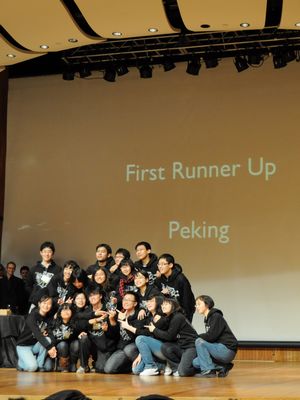Peking University, Nov. 12, 2010: PKU Team won The First Runner Up and a Gold Medal at the International Genetically Engineered Machine (iGEM) Competition on Nov. 8, defeating the other two finalists from the University of Cambridge and the Imperial College London.
The team also defeated Delft University of Technology and won “Best Environmental Project,” an individual award.
Zhang Haoqian, the team leader, lifted the PoPS Trophy – symbolizing one of the highest honors in the field of synthetic biology – at MIT’s Kresge Auditorium, along with the other 16 members from PKU School of Life Sciences, College of Chemistry and Molecular Engineering, Yuanpei College, College of Environmental Sciences and Engineering, and School of Basic Medical Sciences.

The 2010 PKU iGEM team
At the awarding ceremony, the iGEM Awards Committee addressed that the PKU iGEM team "deeply impressed us by meticulous experiment, elaborate design, and amazing results; their modeling method breaks the bottle neck of iGEM modeling."
The annual iGEM competition is a top event in synthetic biology for university students around the world. Synthetic biology is a recently rising interdisciplinary field, aiming at reconstructing current biological systems based on DNA sequence, like regulatory sequence, RNA, and protein, via quantitative and theoretical biological methods, thus creating microbial strains significant for research and applications. It directly builds up the bridge between basic life science research and practical life; some accomplishments would even result in products. Therefore, this field always draws the attention of both the academia and industry.
This year, PKU iGEM team applied genetic engineering method to modify Escherichia coli, in order that it can respond to mercury ion in ultra-low concentrations in water environment. Then through genetic network designing, they reshaped the behavioral pattern in which bacteria respond to external signals, expanded the range of concentrations that bacteria works. Simultaneously, through protein structural altering, they expressed in the bacteria heavy metal protein with high specificity and high affinity. Bacteria can automatically separates away from water after completing metal adsorption function based on the designed gene circuits, and thus realizing the detection and decontamination towards heavy metal ions in ultra-low concentrations.
The PKU team entered the final round, distinguished itself among up to 118 teams from world-renowned institutions, including Harvard University, Stanford University, Universitaet Heidelberg, University of Science and Technology of China, Tsinghua University, Shanghai Jiao Tong University, Tianjin University, and Zhejiang University.
Video: Presentation of PKU iGEM Team 2010
Translated by: Zhang Biyuan
Edited by: Jacques
Source: PKU News (Chinese)